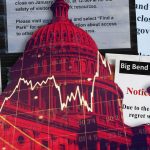© Reuters. FILE PHOTO: A jogger runs by the U.S. Capitol as the deadline to avert a partial government shutdown approaches at the end of the day on Capitol Hill in Washington, U.S., September 30, 2023. REUTERS/Ken Cedeno/File Photo
By Davide Barbuscia
NEW YORK (Reuters) -Rating agency Fitch, which downgraded the U.S. top credit rating in August, cautioned about a possible government shutdown after U.S. House Speaker Kevin McCarthy was ousted, but said it would not affect the U.S. sovereign rating because that already captured the country’s governance issues.
A handful of Republicans in the U.S. House of Representatives on Tuesday ousted Republican Speaker Kevin McCarthy – the latest factor to prompt worry on Wall Street about U.S. political governance after a near-miss with a partial federal government shutdown this weekend and a debt ceiling crisis earlier this year.
“Given the fact that the House speaker was ousted right after the continuing resolution was agreed, we expect political brinkmanship around government funding negotiations will remain tense and a shutdown later this year can’t be ruled out,” Richard Francis, a senior director at Fitch, said in a podcast.
But he added that a shutdown would not impact Fitch’s U.S. AA+ rating as the country’s “deterioration in governance” was already a key factor behind Fitch’s downgrade of the government by one notch in August.
Concerns over U.S. political governance, along with worries over higher interest rates and the U.S. fiscal trajectory, contributed to a sustained sell-off in government bonds over the past few days. Fitch expects the general government deficit to rise to over 6% of gross domestic product this year from 3.7% in 2022 and debt to increase to nearly 120% of GDP by 2025.
S&P Global, which also has a AA+ rating for the U.S., said last week a government shutdown would affect economic activity but was not likely to have an impact on the sovereign rating.
Moody’s (NYSE:), the last major agency to maintain a triple-A rating, warned that a shutdown would harm the country’s credit standing as it would highlight how political polarization in Washington was weakening fiscal policymaking.
Read the full article here




